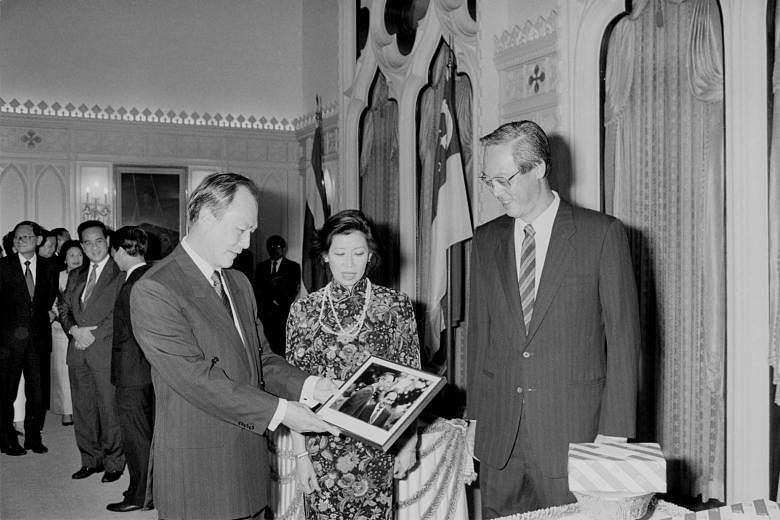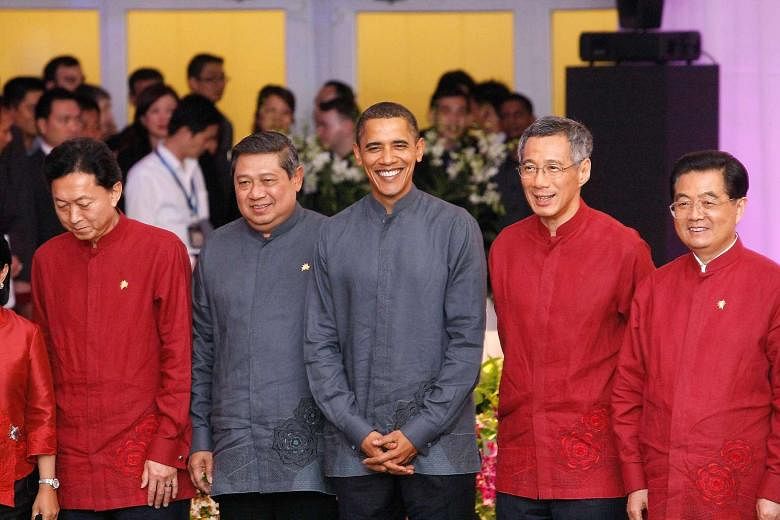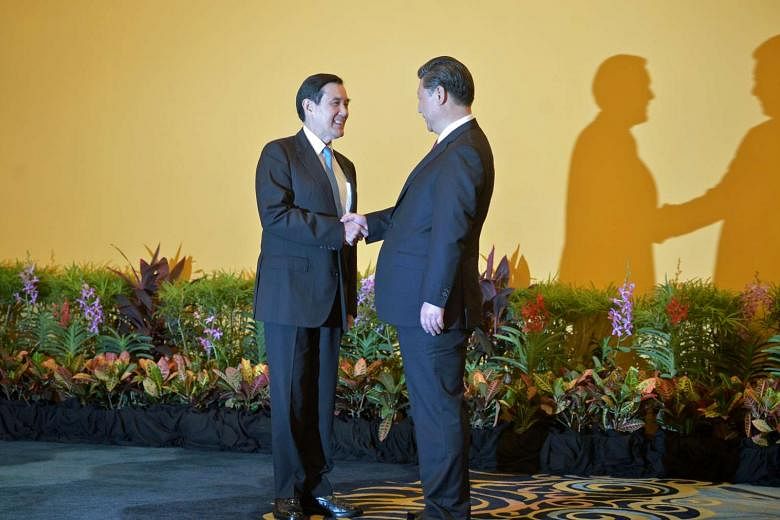The first 25 years of Singapore's foreign policy were shaped by Mr Lee Kuan Yew, and as senior minister and then minister mentor, he remained much sought-after as a statesman on the global stage.
But the second quarter-century was also marked by two subsequent prime ministers putting their stamp in a different way.
This involved behind-the-scenes diplomacy, not so headline-hitting to the public but nevertheless just as impactful on the country in its own way - the establishment of Singapore's network of cross-border trade deals and active involvement in influential groupings to strengthen links between countries and regions.
The strategy early on of seeking free trade agreements - a bold, out-of-the-box step at a time when multilateral trade deals were stalling - set the stage for the unprecedented Trans-Pacific Partnership (TPP) agreement reached in October this year. The TPP is the largest regional trade accord in history.
Indeed, Prime Minister Lee Hsien Loong told leaders of a Group of 20 Summit in Turkey last month that trade deals that are regional or which involve a group of countries, like the TPP, should be seen as positive developments rather than threats to the global trading system.
"We all know that a more open trading system will lift growth and benefit our peoples," he said, acknowledging that leaders also had to have political courage and leadership to explain and persuade their people that trade benefits all.
Mr Lee's comments were cited by several leaders who spoke at the summit, including United States President Barack Obama and British Prime Minister David Cameron.
Since Mr Lee became Prime Minister in 2004, no fewer than 10 FTAs have been signed, including the Singapore-Turkey FTA last month.
Laying the groundwork for the FTA approach was the man Mr Lee succeeded, Mr Goh Chok Tong, premier from 1990. Mr Goh - now Emeritus Senior Minister - spearheaded the signing of several FTAs that were in the vanguard of this cross-border freeing up of business and employment mobility.
It began in the early 1990s, when Mr Goh worked closely with his Thai counterpart Anand Panyarachun to launch an Asean Free Trade Area (AFTA) in 1992.
-
Stroke of diplomatic genius lands FTA
-
A landmark free trade agreement sealed while Emeritus Senior Minister Goh Chok Tong was prime minister was the United States-Singapore FTA (USSFTA) in 2003.
The story of how Mr Goh swung it is an example of Singapore-style diplomacy at work. It involved pragmatism and the personal touch, in this case a mutual love of golf.
In his S. Rajaratnam Lecture in October last year, on The Practice of Foreign Policy for Sustained Growth, Mr Goh recalled: "The Apec leaders' meeting in Brunei in November 2000 was the backdrop. I knew (US President Bill) Clinton was a night owl. I'd done my homework. So before the state banquet started, I told him I'm looking for a partner to play golf. He said yes, he's also looking for a partner. So I said, 'Okay, let's go and play golf.' I anticipated that. I had my golf bag and my golfing attire all packed in my car!
"Then, a sudden rainstorm erupted. And a Clinton aide told me, 'Looks like the game is off.' So I put on a bold front and told him no, I know my weather, this is a tropical thunderstorm, it will blow over in half an hour. Knowing a little bit about psychology, I told him I am going anyway. I leave it to the President but I'm going.
"So I went, and when President Clinton arrived at the course after me, the rain had become a light drizzle. Then he changed into his golfing attire. By the time he finished that, the rain had stopped completely. We played 18 holes (under the lights at night).
"After we had finished, I made a pitch for a USSFTA. My argument was a simple one. The FTA would signal strongly the US' strategic interest in Asia and anchor the US in Asia. He said it was worth doing, so we agreed to launch the FTA, all in under 20 minutes."
Mr Goh gave this takeaway lesson: "National interests are foremost in determining a country's foreign policy; but personal chemistry and relationships are important enabling factors."
The landmark United States-Singapore FTA was also concluded and signed under his purview in 2003.
In his speech for the S. Rajaratnam Lecture last year, Mr Goh recounted that when he took over from Mr Lee Kuan Yew in 1990, Singapore had stable relations with its immediate neighbours, and Asean members had developed cooperative ties. "So we shifted our foreign policy attention to increasing Singapore's geopolitical and international economic space," he said.
Singapore was also in a more comfortable economic position then.
But to continue to grow, it would need more open trade links with partners in the region and beyond.
Officials, therefore, sought to negotiate FTAs as an integral part of foreign policy, when conventional wisdom frowned on FTAs as being incompatible with the multilateral trading framework put forward by the World Trade Organisation.
The first bilateral FTA was sealed with New Zealand in 2000. Others followed suit. While the pacts served the objectives of lowering barriers to trade and investment and opening up business opportunities, they were precursors to something much larger.
In 2005, Singapore signed a trade agreement with Brunei, Chile and New Zealand. Called the Trans-Pacific Strategic Economic Partnership - or P4 - it was the basis of what would become the TPP. Closer to home, this approach of strategic trading alliances will see a tangible outcome in the formation of the Asean Economic Community this month which will bring 625 million people in 10 countries into a common market with a combined gross domestic product of US$2.6 trillion (S$3.6 trillion).
Veteran diplomat Tommy Koh described Mr Goh as the "architect" of Singapore's FTA policy, in an essay on Mr Goh's foreign policy impact in 2004. "Our FTAs have enabled Singapore to transcend the limitations of its small size by linking up with other economies," he wrote.
BUILDING BRIDGES
Another fundamental tenet of the Ministry of Foreign Affairs that has come to the fore over the past 25 years is that of expanding Singa-pore's diplomatic and geopolitical space through the creation of new multilateral forums on the regional and world stage. The most prominent of these is the Asia-Pacific Economic Cooperation (Apec), which is headquartered here.
Together with the creation in the 1990s of an alphabet soup of other forums that brought South-east Asia and other regions closer - like the Asia-Europe Meeting (Asem), Forum for East Asia-Latin America Cooperation (Fealac) and Asean Regional Forum (ARF) - Singapore gained a reputation as a serious regional player, former foreign minister S. Jayakumar noted in his book Diplomacy.
Such initiatives were created not for their own sake, but to broaden the island's linkages beyond the immediate neighbourhood, while also strengthening Asean's relevance to countries far afield through its lead role in these new forums.
"Other countries know that these new inter-regional forums were not only the brainchild of Singapore, but Singapore had worked hard to ensure they took off," he said. "This is what gives Singapore diplomatic space, credibility and relevance."
These forums have also helped Singapore establish a reputation for being an honest broker and a friend to all. This latter point was highlighted last month when the Republic hosted a historic meeting between China's President Xi Jinping and Taiwan's President Ma Ying-jeou at the Shangri-La Hotel.
Aware of the fact that influence comes with size, Singapore has also taken a very proactive approach to gathering other small states together to collectively expand their clout on the international stage.
At the United Nations, Singapore established an informal grouping known as the Forum of Small States (Foss) in 1992, convincing a disparate group of countries from Bahrain to Barbados of the benefits of hanging together. Foss today comprises 105 countries and wields enough influence that candidates for key posts in the UN - such as secretary-general - canvass the grouping for support.
Singapore also helped form a Global Governance Group (3G) of 30 small and medium-sized states, to protect their interests following the emergence of international forums such as the Group of 20 (G20).
Singapore's leadership has turned 3G into an effective pressure group to make mechanisms like G20 more consultative, inclusive and transparent, says Institute of South Asian Studies senior research fellow Iftekhar Ahmed Chowdhury. "The quiet, almost unobtrusive, Singaporean leadership in (the 3G) has been widely acclaimed," the former foreign minister of Bangladesh writes in a paper tracing the group's development.
Indeed, as the current "coordinator" of Asean-China relations, Singapore will have to demonstrate more such leadership in navigating choppy waters, says the assistant group editor of Thailand's Nation Media Group, Mr Kavi Chongkittavorn. "Singapore must serve as a fulcrum for conflicting parties to have peaceful dialogue," says the veteran regional commentator. "The recent Xi-Ma historic meeting is a case in point."
SHARING KNOW-HOW
Making friends the Singapore way has also meant sharing Singapore's only true natural resource with emerging countries: the developmental know-how grown over the last 50 years. This includes the Government's Singapore Cooperation Programme, which since 1992 has trained more than 100,000 officials from 170 countries in areas such as public administration and water management.
There is also the Initiative for Asean Integration, which provides the newer Asean members of Cambodia, Laos, Myanmar and Vietnam technical assistance with the aim of bridging the income gap between older and newer members of the grouping. Since 2000, Singapore has pledged more than $168 million and trained 29,000 officials from these countries.
Such projections of soft power have earned Singapore goodwill.
In an interview with The Straits Times last year, Pakistan's former High Commissioner to Singapore, Dr Sajjad Ashraf, highlighted the island's exercise of this soft power - winning the hearts and minds of people so they become partners.
But observers note that Singapore's reputation for plain speaking and saying it as it is also plays a critical factor.
Mr Chongkittavorn says one strength of Singapore governance is its willingness to take unapologetic but well-considered stands - and this must be retained to ensure its continued exceptionalism.
"Due to its size and location, every word uttered must be carefully constructed in ways that would not increase its existing vulnerability," he says. "Singapore's diplomatic success is partly due to its clear thinking, without the kind of opaqueness practised by other friends in Asean."




